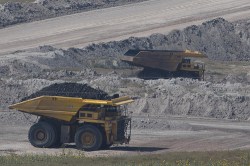
Coal trucks in the Powder River Basin. (Photo by KimonBerlin.)
There are two senses in which coal is artificially cheap.
The more sophisticated reason is the idea that coal has negative impacts on the economy and on public health which are not incorporated into its price. There’s also a practical sense in which coal is too cheap: Coal producers pay far too little for it.
A report in today’s Washington Post provides a clear example of this latter sense, focused on the Powder River Basin overlapping Montana and Wyoming.
The government’s longtime practice of auctioning coal mining rights to a single bidder may have cost taxpayers as much as $28.9 billion over the past 30 years, according to an analysis to be released Monday by the Institute for Energy Economics and Financial Analysis, a Cambridge, Mass.-based think tank. …
The phenomenon — in which a mining company draws up a proposed area for leasing, and the Interior Department’s BLM auctions it off to that same firm — is the rule rather than the exception in the country’s single biggest coal producing region. In the 26 coal leases the federal government has awarded in southeastern Montana and northeastern Wyoming since 1991, 22 have gone to a single bidder. In the other four instances, there were only two bidders involved.
Dave Roberts wrote about a similarly sweet deal in March, in which Peabody — the sole bidder on a large seam — paid the government $1.11 per ton for coal they could sell to China at $123 a ton. Peabody’s next opportunity to win such an auction is this Thursday, as Greenpeace’s Joe Smyth noted over the weekend.
The benefit to companies that “win” such contracts are often immediate.
For now, the market appears to be rewarding the handful of companies operating there when they obtain leasing rights at a low cost. Cloud Peak Energy’s stock price rose 4.8 percent in a single day last year when it obtained a federal lease for a lower-than-expected price, and the target price was raised 19 percent by analysts.
“I don’t really blame the companies, though they’re complicit in it,” said Mark Squillace, director of the Natural Resources Law Center at the University of Colorado Law School. “They’re taking advantage of what the government is allowing them to do.”
Last week during discussion on a Senate measure aimed at blocking the EPA’s mercury regulation, Sen. Jay Rockefeller (D-W.Va.) made an impassioned plea for the coal industry — of which he’s long been an ally — to recognize its perilous position. In doing so, he notes without irony his state’s competition with cheaper regions.
The cheap, easy coal seams are diminishing, and production is falling — especially in the Central Appalachian Basin in Southern West Virginia. Production is shifting to lower cost areas like the Illinois and Powder River Basins.
The solution, of course, is not to reduce the cost of West Virginia’s coal production. At the very least, the solution is to make production in the Powder River Basin reflect the actual worth of the minerals being extracted on the existing market. This is something that one would think a United States senator might be able to impact.
As for the price of coal ever reflecting all of its external costs: If you think that’s going to happen, I have a seam of coal shaped like the Brooklyn Bridge that I’d like to sell you.
Update: There’s another sphere of competition that Rockefeller noted in his comments: natural gas.
Power companies are increasingly switching to natural gas as an energy source, given how cheap it is. But its low cost is apparently also not without some questionable practices. From Reuters:
Under the direction of CEO Aubrey McClendon, Chesapeake Energy Corp. plotted with its top competitor to suppress land prices in one of America’s most promising oil and gas plays, a Reuters investigation has found.
In emails between Chesapeake and Encana Corp, Canada’s largest natural gas company, the rivals repeatedly discussed how to avoid bidding against each other in a public land auction in Michigan two years ago and in at least nine prospective deals with private land owners here.
The invisible hand of the free market could not be reached for comment.



